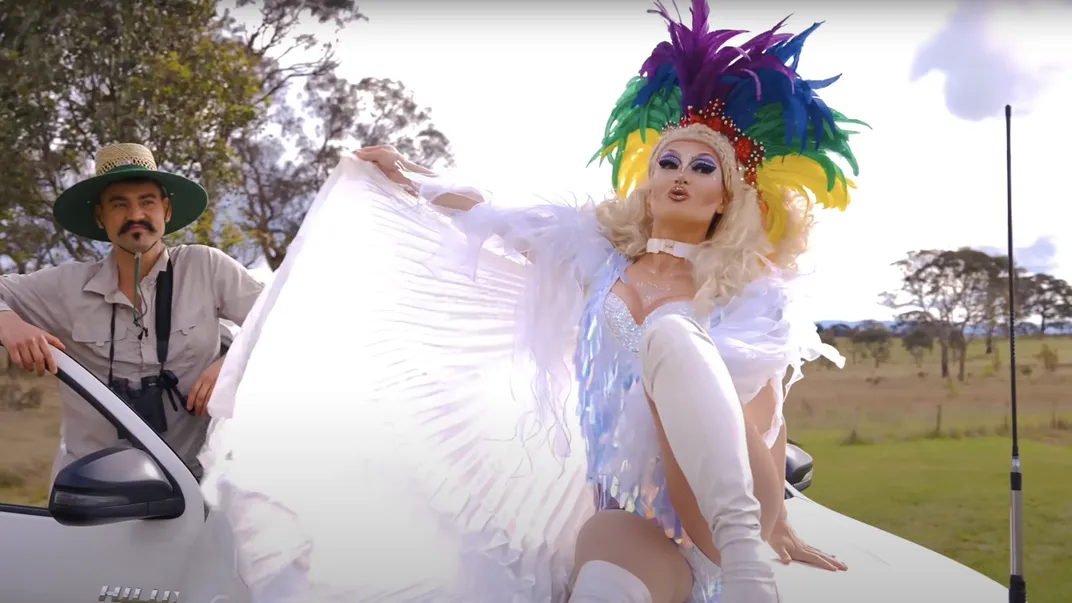Watch This Year’s ‘Dance Your PhD’ Contest Winner, a Musical Celebration of Kangaroo Behavior
“Kangaroo Time” took home the competition’s overall prize, while interpretive dances on early life adversity, circadian rhythms and streambank erosion were also honored
:focal(608x371:609x372)/https://tf-cmsv2-smithsonianmag-media.s3.amazonaws.com/filer_public/fe/ce/fece73a9-b759-4dfe-93cd-3397925041aa/danceyourphd.jpg)
An Australian landscape filled with kangaroos, drag queens, ballerinas and twerking may sound like the onset of a fever dream or a carnival—but for Weliton Menário Costa, a behavioral ecologist at Australian National University who goes by Weli, it was the perfect way to create and share a song about marsupial behavior.
“Kangaroo Time,” a four-minute music video about Weli’s years studying eastern gray kangaroos in Victoria, is as fun as it is informative—one of the reasons why it was named the overall winner of this year’s “Dance Your PhD” competition.
“It’s super incredible,” Weli tells the Guardian’s Kelly Burke. “To win an international science competition, it’s like Eurovision—except we all have PhDs.”
Though it might sound unreal, the dancing contest for scientists is “totally serious.” Weli’s winning video explains his thesis research, “Personality, Social Environment and Maternal-Level Effects: Insights from a Wild Kangaroo Population.” In his work, Weli found that kangaroos develop their personalities early in life, create social groups and dynamics just as humans do and are influenced to act in similar ways as their parents and siblings. As a queer immigrant to Australia, he tells the Guardian that he can relate to how kangaroos modify their behavior in different groups.
“Differences lead to diversity,” he concludes in “Kangaroo Time.” “It exists within any given species; it is just natural.”
The video’s message resonated with the judges, both scientifically and artfully. “There was a sense of surprise and delight in [‘Kangaroo Time’],” judge Alexa Meade tells Science’s Sean Cummings. “You could tell they were having fun through the process, that it wasn’t this labored, stressful experience.”
The origins of the “Dance Your PhD” competition can be traced to New Year’s Eve in 2006, when John Bohannon—a microbiologist and director of science at artificial intelligence company Primer—hosted a dance party for his colleagues and friends. The only problem: hardly anyone wanted to boogie.
“It’s very hard to get anyone to dance, particularly scientists,” Bohannon told NPR’s Barry Gordemer in 2021. “Their parties are not on the dancey side.”
So, like any scientist, he designed an experiment—or, in this case, a dance contest—based on a hypothesis. “One thing you can count on with scientists is they’re competitive and they have a sense of humor about their work, so I thought, let’s just put it all together,” he said to NPR.
The first official contest took place in 2008, and it has been organized every year since by Science magazine and the American Association for the Advancement of Science. For 16 years the competition has made its enduring pitch to scientists globally: “Don’t you wish you lived in a world where you could just ask people to pull out their phones to watch an online video explaining your PhD research through interpretive dance?”
Evidently, many do—dozens of videos each year are submitted to the contest, in four categories of biology, chemistry, physics and social science. Science communication skills are key to a successful video, striking a balance between creativity and sharing new findings.
/https://tf-cmsv2-smithsonianmag-media.s3.amazonaws.com/filer_public/b3/8c/b38cb7f8-95ee-483e-8305-5e302a4cec07/danceyourphd3.webp)
“It’s actually a real challenge, communicating research results and making a clear link between science and the performing arts,” Weli tells the Guardian.
Weli took home the overall winner’s purse of $2,000, in addition to his $750 social science category prize. The three other winning videos this year focused on how adversity in early life can affect how genes work (Siena Dumas Ang, Princeton University), treating the loss of neurons by targeting a protein involved with the circadian rhythm (Xuebing Zhang, City University of Hong Kong) and streambank erosion (Layla El-Khoury, North Carolina State University). In the social science category, the runner-up behind the kangaroos was a video on the invasive browntail moth in Maine.
Past overall winners have included atmospheric scientists from the University of Helsinki in Finland rapping about cloud formations; a swing dance about superconductivity from a researcher at the University of Victoria in Canada; and a stylized music video about yeast cells from a researcher at Vilnius University in Lithuania.
For Weli, one of his most meaningful breakthroughs was with his grandmother, who didn’t quite understand his thesis until recently.
“Once I released ‘Kangaroo Time,’ she was like, ‘That’s my grandson! I get it now!’” he tells Science.
/https://tf-cmsv2-smithsonianmag-media.s3.amazonaws.com/accounts/headshot/ChristianThorsberg_Headshot.png)



/https://tf-cmsv2-smithsonianmag-media.s3.amazonaws.com/accounts/headshot/ChristianThorsberg_Headshot.png)